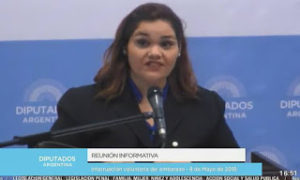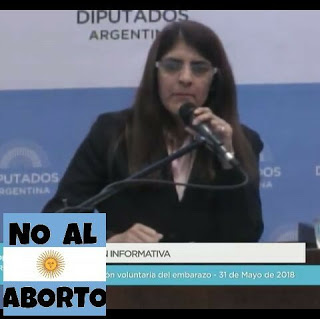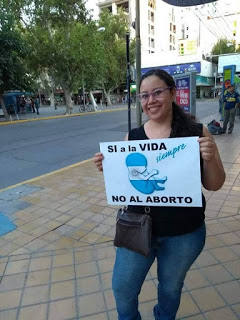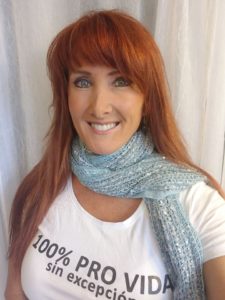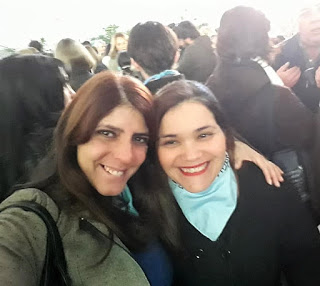
My name is Rebecca Kiessling, I am a wife, a mother of five children — two of them adopted, and I am the president of SaveThe1 (Salvar El 1 in Spanish) an international pro-life organization which specializes in defending all of the so-called “hard cases” through sharing our personal stories.
A good number of members are from Argentina, and they are outraged to see the proposed law to
expand abortion to be legal in all cases up to 14 weeks, and in cases of rape from 14 weeks to up until birth. It was bad enough when the law first began targeting the innocent child conceived in rape.
For those like us who have been conceived in a rape, it is hard to know that currently the “exceptions” are allowed through 14 weeks when a pregnant woman merely says she was raped. And for those told that their child would be disabled, it’s horrifying to know that if a doctor diagnoses that the baby has malformations “incompatible with life” or if it affirms that the mother is in danger of dying, then the child can be killed up to 14 weeks. These three allegations may or may not be true, but all three are discriminating against the most vulnerable people in society who are the ones who would require more effective protection.
On August 8th, the Argentine Senate will vote on whether abortion will be legal in any case and up to birth for the so-called “exceptions.” If approved, Argentina would be the fifth Latin American country to decriminalize abortion without these restrictions, after Cuba, Uruguay, Guyana, Chile and some parts of Mexico — and the killing of unborn children will be rampant.
Save The 1 is an organization of over 600 people who were conceived in a rape like me, mothers who conceived a child after being raped and who are raising their children, mothers who after giving birth placed the child for adoption and others, who regret aborting. In addition, we have hundreds of mothers who were advised to abort because of a poor pre-natal diagnosis. We value life and we hope that the Argentine Senate will protect life without discrimination.
Our Facebook page in Spanish, Salvar El 1, now has almost 68,000 followers. Since the groundbreaking news that Argentina seeks to legalize abortion, we have received a flood of stories from Argentina from those who want to share their testimonies with us. They have been encouraged to come forward by reading my story and those of many others in our organization. Many voices are rising in Argentina, but, most importantly, the voices of the most innocent are going to be heard and the voice will be raised in defense of those Argentine unborn children who still can not raise it and who are at risk.
Like me, Karina Estrella Etchepare (whom I nicknamed “Argentine Rebecca”) was conceived in rape, placed for adoption, is a family law attorney, and is now a strong voice speaking out in Argentina. Her mother was raped by her own stepfather at age 14. Karina testified recently in Congress when the new bill was up for a hearing. She asked Congress: “Does anyone dare to tell me that their life is worth more than mine because I am the result of a violation?” She explained to them that “the mother and child are both victims of the rapist. For that reason, it is necessary to protect them both. No one has the right to say that one life is worth less than the other, much less that of the fruit of a rape, because that baby does not know how she was conceived. If the rapist, with luck, is sentenced to 15 years in prison, why is the innocent baby sentenced to death?”
Margarita Juncos, from Argentina, was also conceived in rape. Her mother was 17 years old when she was raped and gave birth to her daughter alone at a women’s help center. Sadly, she passed away after two months as the result of a heart problem, and Margarita was raised by her maternal grandfather. As an adult, wife and mother, she learned the truth of her conception and birth. She values the gift of life that her mother gave her in the worst circumstances and has even forgiven her biological father.
Adriana Shinki, from Argentina, was conceived in a rape when her mother was only 11 years old. Unable to take care of her, her mother left Adriana in an orphanage where she knew they were going to raise her and care for her. After many years, she had the good fortune to meet her mother and recounted in the blog of Save the 1: “How can I be angry with the woman who gave me life?”.
From the feelings of someone who was conceived in violence, but raised in love, Adriana advises all those who question the exceptions: “If there is a woman who has been raped and who is expecting a child who is the fruit of that act and who is reading my story, I would say that having that child will be the realization that something good can come from something bad, and a child is the most beautiful thing in the world and she will never regret not killing her child. That child is hers, no matter how he or she arrives, and is the one who will love her for the simple reason that she is his or her mother. To people who are the result of a violation I would say, obviously, they are not to blame for how they were conceived and their life is worth no more or less than others. They are the same because we are all human and have the right to live our lives.”
María de la Paz Rodríguez, also from Argentina, was conceived in a rape and placed for adoption.
Today she is happily married and is the mother of two girls. She herself explains to the world, proudly: “My daughters are pro-life — the granddaughters of a raped grandmother, who chose not to abort and placed their mother (me) for adoption. Otherwise, my daughters would not exist!”
“Happily adopted! I am a privileged person of life — because I had two mothers: one who gave me life and another who gave me her life. Who dares to tell me that I should not be born as an unwanted baby conceived during a rape? I am not an abomination of nature because I am not begotten with love. It is better to ADOPT than to ABORT, because every life is worthy!”
Anahí Retsar, also from Argentina, became pregnant after a rape at the young age of 14 years. She contacted Save The 1 to tell us her story. In her words: “It never crossed my mind to kill that child because being raped and being a murderer and blaming someone who does not deserve it, are different things. The child is not to blame for his father’s wrongdoing and does not have to pay for his crime.” Today Anahí is married, she is the mother of several children — some whom she adopted and her eldest son, Catrial, has already made her grandmother!
Sofia, also from Argentina, was raped five years ago. Six months after her rape and in a situation of depression and despair for what was done to her, she learned in a routine medical examination that she was expecting a child as a result of her rape. Against everything that others would expect, “That baby became my motive for life, to love my own life, and became the love of my life! My son is now 4 years old and his name is Ian, which means “sent from heaven.” He is the miracle that God gave me after a misfortune and my strength to move forward. I’m still in treatment to overcome what happened, but with him, my life went from being a nightmare to being a dream.”
As in the case of Sofia, many mothers from rape report how that unexpected and unplanned child — conceived through an act of barbarism, was her motive for moving forward and the only good thing that came out of that horrendous act. The baby conceived is the triumph of good against evil.
Claudelina Sanabria, a resident of Argentina, was raped at age 11 and became pregnant. Without knowing what had happened, she found herself in front of the juvenile guardian judge who encouraged her to have an abortion. But when he explained what an abortion was, she knew that it meant killing the child she had in her womb. With the choppy words of a scared girl but the wisdom of a mature woman, she rejected abortion and gave birth to her baby. “If I had to advise a girl who expects a child after a rape, I would tell her to be strong and to choose life. You will not regret it. I rejected abortion, survived my rape, and there is nothing like giving birth and being a mother! I wish I could make all those people understand that nobody has the right to take the life of an innocent person.”
Viviana Victoria, also from Argentina, suffered sexual abuse since she was 12 years old by a family friend much older than her and was pregnant at the age of 14. But far from being defended by her family or the authorities, she was forced to marry her rapist. The forced marriage and the situation of mistreatment that she suffered almost destroyed her physical and mental health, but, again, her son conceived by violence was her savior. She related her story to Save The 1: “The child I gave birth to came to take away those desires to commit suicide that I had, along with all my unhappiness. He saved my life and gave me hope despite the way he came into this world.”
Akli Ahlet from Argentina became pregnant after being raped in a car and had to overcome not only the aftermath of a rape and her memory, but the contempt of society towards her son conceived in violence who was stigmatized even by the doctors themselves who pressured her to abort. She also wrote her story for Save the 1’s blog: “The doctor told me that my son was disgusting — and all for a crime he did not commit. The doctor said he was not going to survive since he already had low blood sugars. I started to cry and to say that I did not understand why he was against my son if he had not done anything wrong.”
Alba — a birthmother from rape is also from Argentina and recently shared her story with us. She
was raped from the age of 7, kept from attending school, left perpetually hungry, and eventually became pregnant at 10 years old. When her father took her for an abortion, she realized that they were going to kill her child, and she managed to escape — fleeing to her grandmother’s home. Her grandmother was beaten for sheltering her and threatened not to go to the authorities to report the rape. But once Alba gave birth to her precious daughter at the age 11, the hospital reported the rapes. She and her daughter were placed with a loving family, where Alba was able to make a permanent adoption plan. She writes: “I thank God because I had a second chance to have a family, mom, dad and siblings who helped me grow up and realize that life is beautiful.” Alba received an education, a degree and owns her own business.
“I know that my daughter is growing up in a good family surrounded by love and values. Thanks to the fact that I did not allow an abortion and I said yes to life, my daughter was born and her birth revealed the abuses and the situation of mistreatment that I suffered. Thanks to the fact that the Hospital made the accusation and the Juvenile Justice intervened, I was able to get out of the hell in which I lived and today I am happy.”
This is what Alba has to say to the Argentine Congress: “Dear legislators, I leave you with this reflection: Why don’t you transform those unwanted children, fruit of barbarism, products of rape into desired and beloved children through the bond of adoption? An evil is not remedied with another evil. I, at ten years old and illiterate, defended my daughter’s life. Today I ask you who have the duty to legislate to defend life from the moment of conception. Legislate from love and not from the culture of death.”
Please understand that legalizing abortion for rape cases and other exceptions only teaches that the falsity there are lives that are worth more than others. Can you imagine creating “exceptions” for Asian or African or Jewish babies? The message is that they are not worthy of life, and that you do not have to protect their lives. There would be an international outcry if, someday, this were proposed. Yes, it is the same in our case. And we feel that there is great apathy when it comes to valuing our life. Mothers who have children conceived in a rape claim that they are themselves targeted and despised and they are questioned for not having an abortion and because they love that child.
We appreciate the empathy with the victims of a rape, but they are four times more likely to die within the next year after an abortion. In the book of Dr. David Reardon, Victims and Victors, he cites the studies conducted on this. After an abortion, rape victims have a higher rate of suicide and drug addiction. Rapists, pedophiles and sex traffickers love abortion because it destroys the evidence of the crime and empowers them to continue. Often, a girl’s own mother has also allowed her to be violated or left her unprotected. It is the baby in these situations who offers evidence of the rape. If we really want to protect the victim from abuse, we must defend her from her rapist and abortion, and not from her child.
Argentina, you are a great nation, much better than others, because you have established a culture
where people are loved and valued. The Argentinian women who have given their testimony above have been able to share their stories of love for life because they all love their lives and love their children no matter how they were conceived. Please, do not accept the culture of death and discrimination again. We urge you to tell your senators NOT to vote in favor of the decriminalization of abortion. Vote NO on the legalization of the death of an innocent. Do not let the blood of innocent Argentine babies be shed on your soil.
BIO: Rebecca Kiessling is a wife, mother of 5, conceived in rape, attorney, international pro-life speaker and writer, and president of Save The 1 / Salvar El 1.


